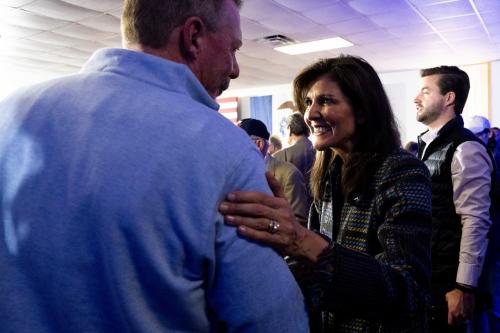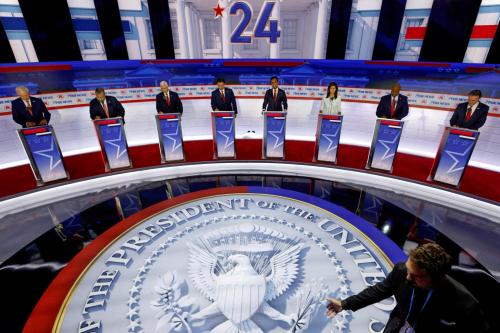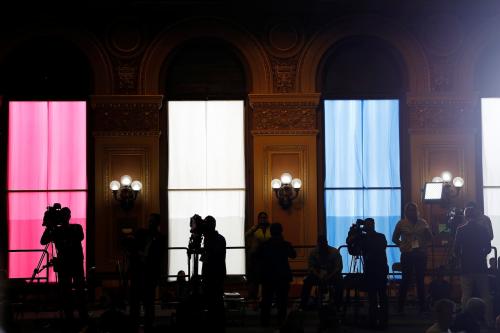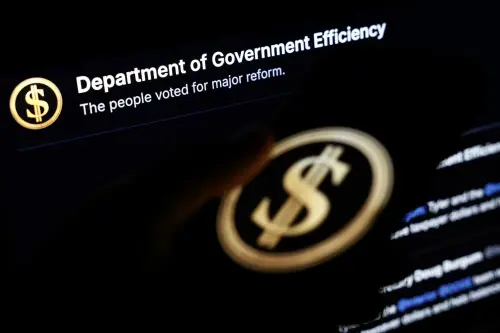In this series, we track key election metrics for presidential candidates throughout the campaign period known as the “invisible primary.”
The list of presidential candidates included in the tracker is based on the candidates listed in AP News, The Washington Post, The New York Times, and Politico’s descriptions of the 2024 field.
Here at Brookings, we’ve been tracking the invisible primary since last summer. And now, with the first real contest, in Iowa, only six weeks away, there are four things that we have learned. First, Donald Trump still dominates the GOP primary field. Second, the race is still, as it has been from the beginning, a battle for the number two spot since the only chance of being able to beat Trump is to consolidate Republicans against him. Third, the race for second place is down to former Ambassador Nikki Haley and Governor Ron DeSantis. Fourth, in that race — Haley has the clear edge.
In politics, nothing signals that you are winning more than being the object of attacks in a debate. In the first few minutes of the fourth GOP debate, DeSantis bragged about being the candidate who “delivers” and attacked Haley as the candidate who always “caved.” And then Vivek Ramaswamy attacked her for having recently received the endorsement of several Wall Street billionaires. At the end of the attacks, Haley defused the onslaught by smiling and saying, “I love all the attention fellas.”
The attacks against Haley continued all night with Ramaswamy slinging vicious and gratuitous innuendos at Haley for being corrupt (as he has throughout this season) and DeSantis regurgitating his opposition research in ways that were detailed but often confusing. Chris Christie, who has managed to garner enough support to stay in these debates, came to Haley’s defense and the warm body language between the two at the end of the debate will, no doubt, awaken fantasies of Christie endorsing Haley in time for the New Hampshire primary where he has some support. Christie, having adopted the role of calling out Trump’s weaknesses, will not get the nomination and Ramaswamy can’t seem to turn his money and aggression into support or likeability in either early state.
Once again, with the exception of Christie, candidates barely touched Trump — a wise strategy in a party where he has a solid base. And Haley seems to have hit upon the best strategy regarding Trump in her closing statement where, after bemoaning the sorry state of America under Biden she said, “You can’t defeat Democrat chaos with Republican chaos and that’s what Donald Trump gives us.”
Haley’s ascendence to the prized second place is evident in our invisible primary tracker. The first metric we track there are media mentions, and recently her position has improved by 200% while the mentions of her competitors have decreased. However, between his courtroom dramas and his large lead in the polls, Trump still gets enormous attention; he averages 114.83 news headlines a day compared to only 19.26 for Haley.
Our second metric is money, and we won’t have official updates there until the end of December when candidates are required to file with the Federal Election Commission. But here too there is evidence of momentum for Haley. On November 28, she was endorsed by the Koch organization — named for the billionaire Koch brothers, Charles and David, who have funded conservative causes for many years. Their endorsement, grassroots organizations, and the political action committee they head promise not only money but needed organizational heft. The Koch endorsement was quickly followed by other deep pocketed Republicans, tired of the chaos around Trump. It will be important not only in the early states, but it will allow Haley, should she emerge from them with some momentum, to buy advertising in the series of expensive Super Tuesday states that follow.
Our third metric is social media. All the candidates — including all the Republican contenders — increased their following on X (Twitter), Facebook, and Instagram. Vivek Ramaswamy continues to have large increases in his number of followers, but the absolute total remains small and doesn’t seem to translate to momentum in other areas.
Our final metric is the polls in the all-important early states — where Haley’s momentum is most noticeable. In FiveThirtyEight’s average of national polls, Trump has a commanding lead — 59.6%. But in Iowa, his lead is significantly lower — 45.9% — a gap of 13.7%. Desantis is in second place, and Haley trails him narrowly. However, neither one breaks 20% support.
New Hampshire, however, is the real source of Haley’s momentum. There, Trump’s lead is even lower, with 44.7% of the vote. Haley is solidly in second place, where she has been since mid-October. Christie is in third place, and DeSantis is in fourth place. However, as in Iowa, none of the other candidates manage to get more than 20% of the vote.
The third contest that will matter is South Carolina. (Nevada is likely to be ignored because only Haley will be on the primary ballot and Trump is expected to sweep the caucuses he has engineered.) There, Trump is stronger with just over 50% in the polling average. Haley is in second place, and DeSantis is in third place. But this is Haley’s home state, so a disappointing showing there could seriously trip her up right before Super Tuesday.
This may be the last debate sponsored by the Republican National Committee. Nonetheless, the debates seem to have done their job. Haley’s performances in these debates definitely allowed her to move past the other contenders so that she looks to be in the coveted number two position — but she is still far behind Donald Trump. As the campaign moves on from the airwaves to the contest on the ground, she will have to translate her momentum into many more votes. She will have to build on the opportunity she has right now to derail Trump and use the chaos and disorder he creates to her own advantage.
-
Acknowledgements and disclosures
Thanks to Jordan Muchnick, and Adelle Patten for their work on data collection and data visualization.
The Brookings Institution is committed to quality, independence, and impact.
We are supported by a diverse array of funders. In line with our values and policies, each Brookings publication represents the sole views of its author(s).








Commentary
Tracking the invisible primary: It’s beginning to look like Haley versus Trump
December 7, 2023